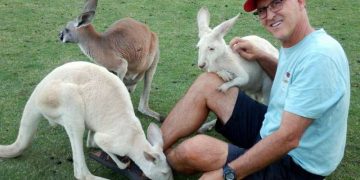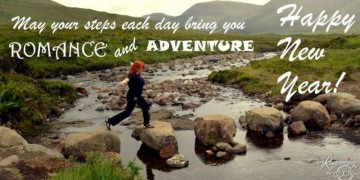Volunteering with rescued elephants in northern Thailand
Elephant Nature Park is an elephant sanctuary
About an hour north of Chiang Mai is a sanctuary for abused, abandoned, injured and retired elephants, plus hundreds of rescued dogs, cats, a herd of water buffalo and a few horses. Many of the dogs and cats have the run of the place, which is great for pet snugglers. Our time there was rewarding, fun, inspirational, educational, exhausting, and a bit frustrating all at the same time.
When we decided to join our friends for a bareboat sailing trip in Thailand we started looking into what else we wanted to do in the area. Sheila quickly set her heart on spending time with Asian elephants and began to learn about our options. Unfortunately, most of what she learned is incredibly heart-wrenching about the realities of life for domesticated elephants. Any elephant activities that would have been close to our sailing base (Phuket) didn’t measure up to her newly learned standard, especially once she read about the Elephant Nature Park and Lek Chailert (the founder). So, we arranged our plans in Asia and added a few more flights to fit into ENP’s weekly volunteer program.
Our experience cost 12,000 bhat each. That was about $400 each for the week, so $800 as a couple, for our room, meals, opportunity to volunteer and transportation to/from Chiang Mai (not flights).
We’ve all seen adventurous or romantic footage of people riding elephants and without knowing any better that might seem like a great bucket list activity. Sadly, no. Not once you realize the torture each elephant went through to be broken. It’s cruel, heart-breaking and damages the elephants for life physically and emotionally. For many, abuse and neglect will be the only life they ever know. By supporting even the most “humanely” operated elephant camps/treks/performances, tourists unwittingly continue the cycle of cruelty by creating demand for more baby elephants to be taken from their moms and brutalized by the phajaan process, aka the “crush”.
ENP’s focus is rescue and conservation as an elephant sanctuary
Most of the 44 elephants here were rescued (purchased) from a life of abuse or neglect when their age or poor health made them less useful to their owners in the tourist or illegal logging industries – many are blind, disabled or injured (some from land mines, most from humans). Some are gentle and friendly, others are a bit crazy and you keep your distance. All are loved.
Here’s a bit of drama we were lucky to witness! Mamas separating playing babies…
We, and everyone we spoke with, are truly touched by the heart and commitment of Lek Chailert (ENP’s founder) and her staff! She’s an impressive human being and she has attracted a dedicated staff. They provide medical care, food and a safe haven for the elephants to heal and live among other elephants without expectations to perform, while still creating an intimate experience for visitors and volunteers. Some of us even find romance in elephant poo!
ENP mahouts (the trainer/companion to each elephant) are retrained away from traditional tools, like painful bull hooks, instead using more respectful, loving ways to guide them. By their example, ENP works to help elephant trekking companies understand kinder ways to treat the elephants and that tourists will pay for the experience to be with these beautiful pachyderms without riding them or having them perform. We met several elephants who were born here and will never endure the “crush”!
We thoroughly enjoyed our time with the elephants. We learned a lot and really felt like we were making a difference in their well-being or at least in easing the enormous work load of the staff. It’s powerfully moving to watch these beautiful creatures as they go about their day with their family groups and best girlfriends. They’re free from abuse and fully cared for, free to form their own bonds with each other, roam this peaceful valley and play in the river. Hearing sweet elephants call out to their blind girlfriend to guide her to them, seeing the vigilance with which self-appointed nannies watch out for the babies.…It’s all an enlightening, intimate and educational experience.
The volunteer coordinators who instructed and supervised us in our tasks were funny, patient and terrific guides. They organized us into groups, assigned our daily duties, led us on our tasks, solved problems, and generally did a great job of making it fun. They even hosted an entertaining evening of Thai Language and Culture 101.
We really enjoyed meeting other volunteers from around the world. A few were our age or a bit younger, but most were under 30, single (smart and attractive) women on their “gap” year (or months) adventure. A young, single man with a good heart and willing muscles would have a great time getting to know the adventurous, big-hearted lasses that are drawn to this sanctuary! We made friends we truly hope to stay in touch with and visit again somewhere in this fabulous world.
As volunteer workers, we were assigned a variety of tasks. There are two shifts a day – from about 8 – 11 AM and from about 1 – 4 PM, although we sometimes finished early. Most tasks were related to food – obtaining the food, preparing the food, or cleaning up the fully processed food (shoveling poo). Sometimes we shoveled poo where the elephants gathered in the fields and sometimes we cleaned out their evening enclosures.
One day, we rode in the back of a truck to a field where workers chopped down banana trees and we carried the banana tree trunks and loaded them into the truck. Who knew elephants eat banana trees?
Another day we rode a truck to a corn field. First we cut the corn stalks at the base with a machete. Then we bundled the stalks and carried the bundles to the truck. The truck was full to the top and we rode back on top of all that corn – very dangerous, but the breeze sure felt great. This was by far the most grueling day since it started with a long drive at 8AM and we didn’t return to the park until about 3PM – in over 100 degree F temps! (high 30s C)
There was kitchen duty – unloading trucks full of melons, washing melons, shucking corn, and more. Our group got into a rhythm and made it all fun!
We had daily opportunities to feed elephants and “bathe” them in the local river with buckets of water.
One of our shifts was devoted to a walking tour of the park. Our guides took us to places not generally accessible, including the veterinary area and the bull elephant enclosure. The adult males are not allowed to roam with the rest of the herd since that would cause many elephant social issues. The bulls seemed genuinely “excited” to have visitors.
The local tribeswomen have a great massage service each evening on the upper deck of the main building. It was welcome muscle-soothing relief and for less than $5 per hour we had one every night. Plus, it was the only area with a fan!
As for accommodations, the volunteers are “roughing it” – the housing is just a step above camping. Fortunately, the beds have mosquito nets, but the ceiling fans are woefully lacking. There are bugs that buzz, hum, click, crawl, skitter, and occasionally bite. We saw some spiders straight out of Jurassic Park. We were fortunate to have a shower that always had at least a trickle of cold water; some volunteers had no running water and had to borrow a shower from others quite a distance away. We really are fine with roughing it, but a little TLC would go a long way here.
The main gathering area is like a spacious safari lodge, with observation decks and lots of tables.
As much as we enjoyed working with and learning about the elephants, and the camaraderie of all our new friends and co-volunteers, we needed to leave a day early. Tom had a head cold and Sheila had bad tummy troubles, so we returned to Chiang Mai and nursed our health with a real shower, a soft bed, air conditioning, and some pork chops.
Good-bye sweet elephants! Bought a carving made by Full Moon’s mahout, even with a flower in her ear!
We definitely recommend the Elephant Nature Park for a visit – for one day or maybe an overnight or two.
Without question, ENP’s commitment to animals is passionate, full on and making a huge difference in Thailand! We just read that another camp released their 60 elephants from the trekking role with the influence of Lek! For them to make that change after so many years is truly remarkable.
It’s easy to return home from ENP and only remember the amazing, unique, once-in-a-lifetime experience of living with elephants for a week. Knowing what each of these elephants has endured for decades, makes one less inclined to complain about personal discomforts. Even the volunteers who were terribly frustrated at that time may read this and think “oh, it wasn’t so bad and it’s worth it for the experience with the elephants”. TRUE, we agree, it’s worth it, BUT it could be SO much better with some simple, yet important changes. Changes that will make a difference as ENP grows and continues to invite volunteers and visitors to support them.
We also feel that telling only the amazing parts of our story isn’t being honest with our readers (although it would have been much simpler to write!). Friends of ours did the day visitor experience based on our recommendation and they loved it! Day visitors get many of the best moments of our week packed in one awesome day. Again, I think one to three days is ideal. We can’t enthusiastically recommend longer without further discussion. So, hopefully, we don’t come across as a couple of old whiners.
Before we rant, here is the whole week summed up in one very fun video!
Suggestions we’ll make to ENP:
* Be clear about the menu. The website states “vegan and vegetarian food is available and all dietary restrictions are catered to”. We mistook this statement to mean that vegetarian meals are available, if requested. The fact is that vegetarian dishes are the only option because no meat is ever served. Now, we want to be delicate about this. We know and respect many vegetarians, and we (especially Tom) love a good salad. But we felt a little ambushed. It wasn’t just that they don’t serve meat, it felt more like a crusade with a loud “how dare you eat chickens?!” attitude. The first day or so we thought the food was pretty decent, but it became very boring very fast. This is the only place I know where you can have 3 all-you-can-eat buffets per day and still lose weight.
The confusion was true for daily volunteers also. Each day the new group ate at the same buffets we weekly volunteers did. Each day the same conversations took place about whether or not there was meat. Well, “this” looks like meat. No, it’s cleverly disguised something else. Then, someone would clarify that everything is vegetarian and there’d be grumbling down the line. Other vegetarian alternatives would be welcome. The only day they served a pasta dish it was gone is 4 minutes, not kidding.
As we learned more about their facilities, we realized it’s actually a good thing they don’t serve meat since power / refrigeration is inconsistent and they have a routine of putting the food out at 3:30 or 4PM (then light the bunsen burners when dinner is served at 6PM). We asked staff about this and they expressed concern, too. In fact, we were asked to please inquire about it because the concern would have more merit from visitors than staff. Plus, we (and many other campers) had a bad case of queasy tummy for most of the week.
* Provide a room key for each guest. Single guests get an assigned roommate for the week and sometimes that leads to lifetime friendships, but it also comes with a few challenges. Sharing a key shouldn’t be one. We knew a few people were frustrated with their roomie because they couldn’t find them and needed to get into their room. It wasn’t a big deal for Tom & I, but even for us there were times one needed to get into the room and the person with the key was elsewhere. We even chose to leave the door unlocked a few times, which they strongly advise against, but we didn’t want to hold up our teams. Charge a $10 deposit, if you must, but give 2 keys.
* Our room was very spacious, but SO dirty. Unfortunately, there’s not much they can do about that since the floor is an open weave bamboo and the room sits above the workshop. Socks were black just walking for a few minutes. Honestly, not a big deal; we like cabins and such, but there were obvious nails sticking out of the floor and broken furniture that could easily be fixed. Hammer those nails into the wall to give guests somewhere to hang things off the floor – Simple fixes.
* We strongly recommend that ENP needs to have an English speaking person that the volunteers feel comfortable talking with about concerns. By day 4 we heard lots of grumbling, disappointment and sensed a feeling of futility, especially from those who didn’t have running water and those staying in the dog volunteer lodging with no water. There was also a feeling that the main person who does speak English would not be receptive to complaints. They are fantastic ambassadors for the animals; we feel they need at least one ambassador for the humans.
* We were fortunate that our official introduction meeting was led by Jodi in English. She mentioned that’s not the norm and they are encouraging it. Really seems like a requirement to us. They can’t be expected to have a guide who speaks every language, but the majority of guests did speak English. Jodi was great. She knows her stuff and she loves the elephants. She gave us a great introduction to the park, an overview of expectations for the week and strong safety guidelines for interacting with the elephants.
BUT, Jodi is strongly against much of the interaction that draws visitors to the park. She was clear that any of our desires to touch the elephants and take photos with them is looked down upon and although it would be tolerated by the elephants, it was simply selfish. Even the much touted “bathing the elephants” was just a photo opp. Wow! Way to burst our bubbles! I appreciated learning the realities of interacting with elephants and how they think and feel, but as I sat there holding the ENP brochure that shows a happy blonde gal touching an elephant’s trunk, I felt sharply slapped for wanting something THEY are promoting.
I really enjoyed just watching the elephants interact, being in their presence, wishing them blessings and health and hoping their life at ENP truly helps them heal from their past pains. Just being around them IS enough, but I also got a HUGE thrill from looking deeply into their sweet eyes (even if it only has meaning for me and not the elephants, as some might say), touching their trunks, talking with them and offering them food…and yes, having a photo taken of my happy face near theirs!
The volunteers who choose to come to ENP do so knowing and respecting ENP’s commitment to the elephants. No riding, no tricks, no art, no performing. Just be elephants. Yay! So, we’re on board, we support you and we’ll help spread the word. Meanwhile, please don’t treat your visitors, whose fees are helping to support ENP, as if they are the bad guys. If ENP is trying to move towards more of an “observe from a distance, but don’t interact” park model, which may have merit, then their marketing needs to change.
I’m sure the staff members see VISITORS DO STUPID things on a regular basis. Some of those probably ARE stupid or uncaring; others may be simply unaware, esp. if they’ve had no instructions in a language they understand. Mornings were great fun since the elephants would meander over to our main building for snacks. I found it sadly amusing to see how quickly new weekly volunteers would judge the actions of the daily volunteers who were having a grand experience and just didn’t know better about standing too close or not to extend their hand without food. NONE of us knew better only two days earlier!
* Suggestion for communicating the park rules/expectations: During the hour and a half drive to ENP a video is shown. We later heard that the video varied by van. For us it was educational about the plight of Asian elephants. There would have been time afterward to show another one to explain park safety rules and guidelines for interacting with elephants. One small tip we heard, but others didn’t was that it’s not proper to wear a bathing suit/bikini while bathing the elephants. Easy to see how people who just spent time on the beaches of Phuket and the islands wouldn’t realize this was uncomfortable for the locals.
* Elephant names: Having a bulletin board or book with a photo and name of each elephant would have been a real help for connecting and understanding the family dynamics. There are such IDs for the dogs, so hopefully they’ll create something for the elephants.
* Pet allergies: this will sound ridiculous to mention since most people going to an animal sanctuary expect to be around animals and know their own limits regarding allergies. Yes, there are hundreds of dogs and cats roaming the property and that’s actually wonderful. The ones allowed to roam freely are sweet and, for the most part, they get along with people and the other dogs. Sheila has some pet allergies, so she’s learned to resist petting, esp. if she can’t quickly wash her hands. What we didn’t expect was that every massage matt, every massage pillow you plant your face into and every cushion you sit on doubles as a pet bed. Benadryl was plenty helpful for her, but someone with worse allergies might have a tougher time. It would be great if they would set the massage pillows away from animals when not in use.
Facts, as we understand them: In 1900 there were 300,000 wild elephants and 100,000 captive elephants …. now there are 2,000 wild elephants and 4,000 captive. You know the plight of captive elephants. For wild elephants – as their home areas have diminished they often get too close to settlements, causing damage to crops or properties as they forage. They are often killed, injured or captured leaving orphans who die or are captured. Perhaps someday there will be more areas like ENP where even wild elephants can be transported to roam freely within an area of 100s of acres of enclosed elephant heaven.
So, please DO enjoy visiting elephants wherever you can in the world; just choose responsibly.
Choose parks like ENP where the elephants are truly safe, loved and able to just be elephants. Please DON’T support any activities where elephants perform, give rides, or beg for food on the streets. Don’t even “Like” videos on the internet that show elephants painting or doing other things elephants don’t do. Seems cute, but nope.
The end.
Trip Date: March-April 2015 – As part of 5 1/2 weeks which included Thailand and Cambodia Overview, SCUBA Diving, Tigers in Phuket, Bareboat Sailing for 10 days, Temple ruins in Siem Reap, Volunteering with Elephants, Chiang Mai and Bangkok.
? Tell us about your experiences or thoughts about elephants and animals in similar predicaments.





4 Comments
Great post! I loved how honest you were about the experience and didn’t just gloss over it to avoid sounding “negative”. As someone who is interested in volunteering, it is great to have all the facts. Appreciate you sharing your experiences and recommendations.
Chantell, I’m so glad. We do highly recommend the experience, just felt that knowing what to expect would make a difference to others as it would have for us. We are VERY interested in learning about other volunteer opportunities, so let us know of any you recommend 🙂
Happy to see someone pointing out the cruelty of the elephant trekking tours so many people seem to have on their to-do lists. So many tourists don’t take the time to look deeper into what their bucket list items may really entail. Great to read such a well balanced post.
Hi Sandra, yes, I’m so glad I learned what I did about riding elephants BEFORE visiting Thailand. Thank goodness for the internet. Hopefully, more travelers will change that bucket list activity to experiencing sweet elephants in a sanctuary environment, NOT riding or any other circus type performances.